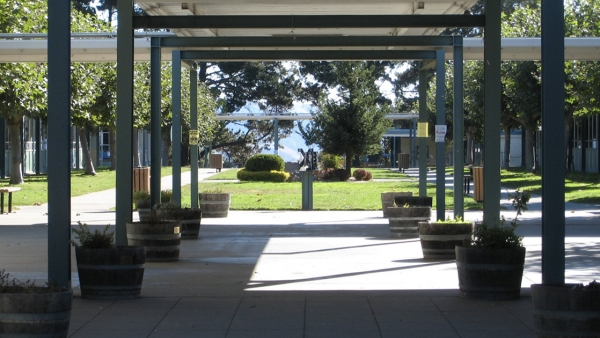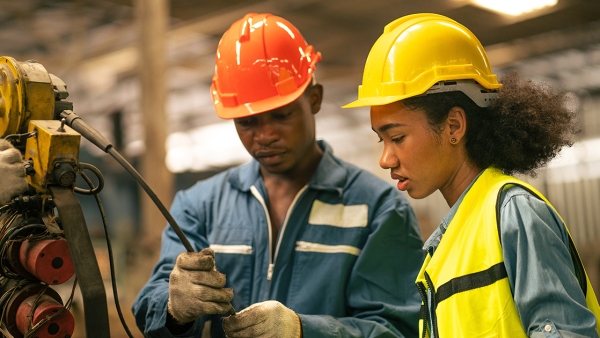MDRC’s Center for Effective Career and Technical Education is a hub for building, synthesizing, and applying evidence on the effectiveness of CTE.
As high schools, community colleges, policymakers, and families try to prepare our children for a rapidly changing future, we provide them with forward-looking perspectives from education and workforce leaders on the power and potential of CTE.
In the next decade, the labor market is predicted to create millions of green jobs. This blog post presents the Delaware Department of Education’s response: a project to embed principles of environmental literacy—an understanding of the relationship between human and environmental systems—into statewide career and technical education pathways.
For almost 15 years, the Green Energy Pathway at Skyline High School in Oakland, California has been educating students with a project-based curriculum that explores science-based solutions to global warming. That longevity means the Green Energy Pathway may offer lessons on how to make environmentally focused education successful and sustainable.
A Public-Private Workforce Training Initiative in Los Angeles
California has become an incubator for climate innovation—setting ambitious targets for reducing emissions and creating jobs in the clean economy. Nonprofit organizations, educational institutions, and employers have come together to create the Los Angeles Regional Cleantech Career Academy. MDRC sat down with Academy leaders to learn more.
System-Wide Strategies for Helping Adults Access Training and Earn Credentials
This blog post discusses two programs, developed by the Virginia Community College System, for helping adults access training and earn credentials that improve their labor market prospects and provide on-ramps to further education. MDRC and the Community College Research Center are conducting studies of the two programs.
How a Career Academy Is Training Students for the Sustainable Economy
As the United States grapples with how to address the impacts of climate change, some cities are implementing initiatives to address climate change at a local level. Adopted formally by the city in 2022, the Kansas City, Missouri “Climate Protection and Resilience Plan” calls for a 100 percent reduction of greenhouse gas emissions from the city’s operations by 2030.The plan also includes a focus on the needs of marginalized communities who disproportionately experience the effects of climate change.
A New Study Will Explore the Practice and Promise of Noncredit Workforce Training Programs
Policymakers, community colleges, and philanthropies have invested heavily in short-term or “stackable” noncredit career and technical education programs, despite a lack of evidence that the programs support positive career outcomes. A new MDRC study will explore how such programs influence outcomes including academic progression, program completion, employment, and earnings.
“Soft skills” are the capabilities and habits that affect communication, social interactions, and problem-solving. Credentials in soft skills aim to show employers that job applicants are proficient in these skills. MDRC interviewed employers to gauge how they perceive these credentials and to learn what could increase their utility and credibility.
Rachel Rosen, codirector of MDRC’s Center of Effective Career and Technical Education (CTE), describes how recent evaluation findings about the P-TECH 9-14 Schools model advance the field’s understanding of ways to better serve students. A version of the interview originally appeared in the Advance CTE blog Learning That Works!
Career and technical education (CTE) and workforce development have seen a surge in the popularity of short-term training programs that purport to give community college students skills highly valued in the labor market that will help them get jobs quickly. These programs, which are often just referred to as CTE programs, actually vary greatly: Some of them last a few days, some a few weeks, and some a few years. In some, students earn college credit, some offer no credit, and many result in industry-recognized credentials or licenses.
Recent federal and state policies are creating momentum for combating climate change by tying a clean energy transition to job growth. MDRC and JobsFirstNYC convened 30 stakeholders from locations across the country to discuss how career and technical education and workforce development programs can train people for green careers.
To learn more about how program designers, educators, and other stakeholders can learn from the past to build equitable career and technical education (CTE) programs today, MDRC’s Center for Effective CTE spoke with Dr. Eddie Fletcher, an associate professor in workforce development and education at The Ohio State University.
The COVID-19 pandemic exposed inequities in access to and success in career and technical education (CTE). This post summarizes a discussion among teachers and program coordinators about what has changed a year into remote instruction, and about how to make CTE programs more equitable now and when in-person instruction returns.
Recent federal policy supports creating middle-class jobs in the “green economy.” To better understand how community colleges can build programs that provide reliable growth trajectories for students in this field, MDRC talked with two practitioners about the North Carolina Community College System’s 10-year-old “Code Green” initiative.
Career and technical education programs are trying to address challenges faced by disadvantaged students, particularly Black students and other students of color. Access is only part of the path to equity as these programs focus on inclusive workplace environments, meaningful mentorships, and language that emphasizes strengths rather than real or presumed deficits.














